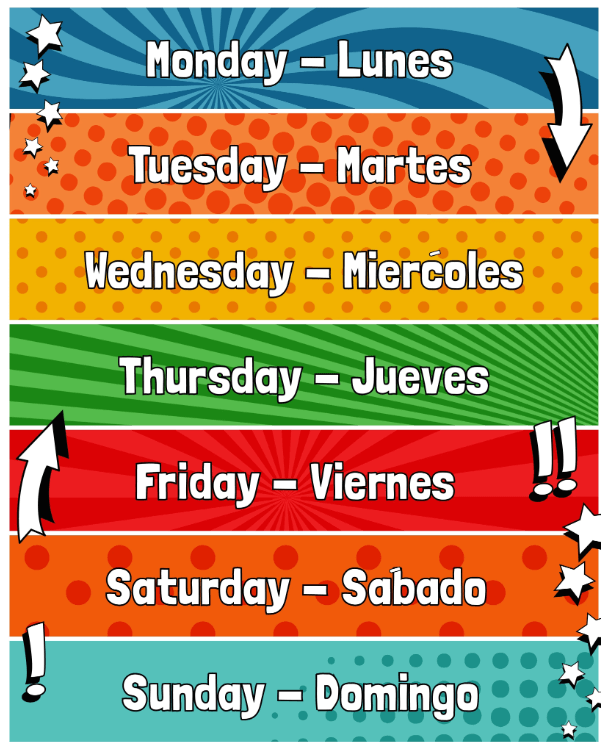Learning the days of the week in Spanish is more than memorising them. Each day has a story behind its name and plays a unique role in Spanish culture. This guide doesn’t just teach you how to say the days and use them in sentences. It also shows how these days fit into everyday life in Spanish-speaking places. Knowing these details also brings you closer to the language, helping you respect and appreciate its rich heritage.
How to Say the Days of the Week in Spanish

Let’s discuss how to pronounce and use these words. This will help you build your vocabulary and better understand Spanish.
Monday – Lunes
The week starts with Monday, or ‘lunes’ in Spanish, named after the moon.
Pronunciation: Stress the first part: LOO-nes. The ‘u’ sounds like the double ‘o’ in ‘look.’
Tuesday – Martes
After ‘lunes,’ we move to ‘martes,’ which means Tuesday in Spanish. The name comes from Mars, the Roman god of war. This shows how deeply Roman mythology is woven into the Spanish language.
Knowing this can make learning Spanish more interesting. It’s not just about memorising words. For example, say ‘martes’ correctly: ‘MAR-tes.’ Try using it in everyday talks, like saying, ‘El martes voy al gimnasio’ to mean, ‘On Tuesday, I go to the gym.’ This helps with remembering the word and getting better at the language.
Pronunciation: Say it like MAR-tes
Wednesday – Miércoles
Let’s keep going with the days of the week in Spanish. ‘Miércoles’ means Wednesday, and it is named after Mercury, the Roman messenger god. It’s smack in the middle of the workweek and means different things in Spanish-speaking places.
Pronunciation: Stress the first syllable; it sounds like ‘mee-AIR-koh-less’.
Thursday – Jueves
Let’s talk about ‘jueves’, or Thursday. Its name comes from the Latin ‘Iovis Dies’, meaning ‘Day of Jupiter’. Jupiter was the Roman king of gods, ruling the sky and thunder, similar to Zeus in Greek mythology. This shows how deeply culture and religion influenced the Roman calendar and the Spanish language.
Regarding everyday use, ‘jueves’ are key for planning and scheduling in Spanish-speaking areas. It’s important to say it right: the ‘j’ sounds like an English ‘h’, and the stress is on the first syllable, so it’s ‘HWEH-ves’. Knowing the story behind the word helps with learning and adds depth to our understanding of language and its development.
Pronunciation: Say it like HWEH-ves with stress on the second syllable and gentle vowels.
Friday – Viernes
Let’s talk about ‘viernes’ or Friday, which ties back to Venus, the Roman goddess of love and beauty. This connection shows how deep cultural and mythological elements weave through the Spanish language.
Pronunciation: Say it as ‘VIE-nes,’ with a stress on the first syllable to ensure you’re understood.
Saturday – Sábado
Saturday in Spanish is ‘sábado’, named after Saturn, the Roman god of wealth and time. This connection shows the deep cultural and historical roots in the Spanish language. Typically, ‘sábado’ is a day for relaxing and enjoying yourself, which fits its grand origins.
Pronunciation: Say it like SAH-bah-doh” with stress on the second syllable and gentle vowels.
Sunday – domingo
Sunday in Spanish is ‘domingo,’ linked to the sun and has deep cultural roots. It’s the day we wrap up the week and generally spend time resting or with family. Knowing ‘domingo’ well can boost your Spanish and understanding of the culture.
Pronunciation: Say it like ‘do-MEEN-go’ with stress on the second syllable and gentle vowels.
Mastering the Days of the Week in Spanish
To get good at the days of the week in Spanish, you need to nail the pronunciation and the words themselves. It’s also cool to know about the culture and grammar to use them correctly when you’re talking. Picking up common phrases and tips helps you fit these words smoothly into everyday chats.
Pronunciation and Vocabulary of Spanish Days
Learning to pronounce and understand the days of the week in Spanish is vital if you want to communicate well and get a deeper sense of the culture. Here’s what you should focus on:
- Clear Pronunciation: Pay close attention to how you pronounce each day. For example, in ‘miércoles’, the stress is on the second syllable. This makes a big difference in how you sound.
- Practice Regularly: The more you use these words in everyday sentences, the better your pronunciation and memory will be.
- Listen to Native Speakers: It’s beneficial to hear native speakers. They show you how to say the words just right.
- Use Visual Aids: Things like flashcards or apps are great for helping you remember. They can link the days of the week to their order and how they are used in real life.
Cultural Insights and Grammar for Spanish Days

Learning about the days of the week in Spanish helps with language skills and understanding Spanish culture. It’s quite important to learn these basic things as there are many countries in the world that speak Spanish. The days—lunes, martes, miércoles, jueves, viernes, sábado, domingo—come from names of planets and mythological gods, showing the Roman impact on history.
In Spanish, days are masculine and typically not capitalised. Spanish speakers often use ‘el’ or ‘us’ before the day name when talking about events on specific days. However, after the verb ‘ser’ like in ‘Hoy es martes,’ they don’t use an article. Knowing these small details helps you get the language right.
Common Phrases and Usage Tips
Improving your Spanish involves mastering everyday phrases, especially those related to the days of the week. Here are some straightforward tips to help you communicate more clearly:
- Prefixing Days with ‘el’: Always add ‘el’ before the days when you’re talking about specific events. So, if you’re saying you’re visiting the doctor on Monday, you’d say, ‘El lunes voy al doctor.’
- Talking About Future Events: When discussing plans for upcoming days, use ‘el próximo’ for the next or ‘este’ for this. For instance, say ‘El próximo viernes’ to mean next Friday.
- Routine Activities: Talk about your regular activities without using an article. Say ‘Voy al gimnasio martes y jueves’ to mean you go to the gym on Tuesdays and Thursdays.
- Past Events: Use ‘el pasado’ to talk about days in the previous week. For example, ‘el pasado miércoles’ means last Wednesday.
These tips help make your Spanish conversations and writing clearer and more natural. Keep practising, and you’ll notice your fluency improve!
Conclusion
In conclusion, learning the days of the week in Spanish is more than memorising words. It’s about understanding where these words come from, the culture they reflect, and the grammar rules they follow. Getting good at this can improve your Spanish. When you discuss everyday activities, plans, and historical events, you can talk more accurately and better grasp the culture.

